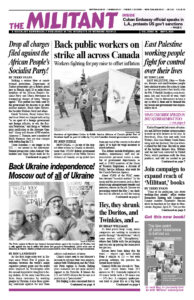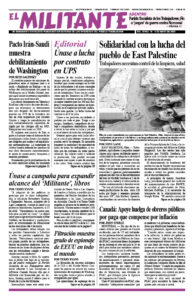PAULSBORO, N.J. — “They had the whole town shut down,” James Lewis Sr. told Socialist Workers Party members visiting this southern New Jersey town. They were asking about the 2012 train derailment and release of vinyl chloride after the collapse of a rail bridge over the Mantua Creek here. That’s the same chemical that was drained onto the ground and set on fire in East Palestine, Ohio, in February. Lewis has lived in Paulsboro all his life.
“You never know when this could happen again,” Lewis said, pointing to long trains that block rail crossings and divide the small town in two. “What would happen if a fire started and the fire brigade couldn’t get across?” Bridges or underpasses could be built, he said, but rail bosses don’t want to do anything that would cut into their profits.
Like many residents here, José Montera, a drive loader at a junkyard, was evacuated after the 2012 derailment. “They put us up in a hotel and offered us money to keep quiet. It’s cheaper for them to do that than maintain the bridge that caused the derailment.”
When the swing bridge failed to close properly, seven of the train’s 83 cars spilled off the tracks and four fell into the creek. One was sliced open, releasing 23,000 gallons of the toxic chemical. Some 250 people went to the hospital, many with respiratory problems. The National Transportation Safety Board says Conrail, which was responsible for maintaining the bridge, had been warned about problems with it 23 times in the year before the derailment, but did nothing.
Weeks after the disaster, authorities held a town hall meeting, Montera said. “One man got up and asked whether the water in the creek was contaminated. He got no answer. He was furious. The chemical company doesn’t care about people.” In the years since, a federal court ruled against setting up a medical program to monitor long-term health effects on Paulsboro residents. Exposure to vinyl chloride is linked to cancers.
Oil refinery worker Rich Miner lives in Paulsboro. “This is a poor town,” he said. “They gave people money to keep quiet, because they knew that people are desperate.
“I volunteered to help on the cleanup, because of my work experience at the refinery,” he said. “They gave us respirators, but some of them had the wrong cartridges. They were useless.”
SWP member Seth Galinsky told Miner about the fight of workers, farmers and small-business owners in East Palestine since the derailment there. An ongoing outcry by residents forced rail bosses at Norfolk Southern to tear up new tracks they had put down to get trains running again in order to dig up all the contaminated soil they had left sitting there.
The health and safety of people living near the tracks is tied up with the fight by rail workers for safer working conditions, Galinsky pointed out.
He showed Miner Malcolm X, Black Liberation, and the Road to Workers Power. Miner said he’d heard that Gloria Richardson, a leader of the powerful fight to desegregate Cambridge, Maryland, and a collaborator with Malcolm X, had died. “People like her — they’re our real leaders — but they don’t tell you anything about them.” He got a subscription to the Militant and the book. His partner, Sheree Artis, was already reading it before the SWP members left.
The party campaigners sold six subscriptions and five books by SWP leaders.
Roy Landersen in northern New Jersey contributed to this article.

